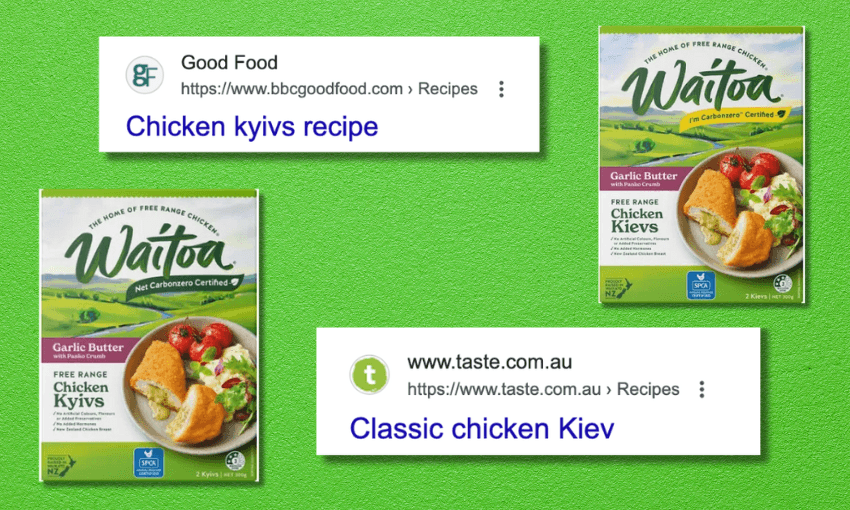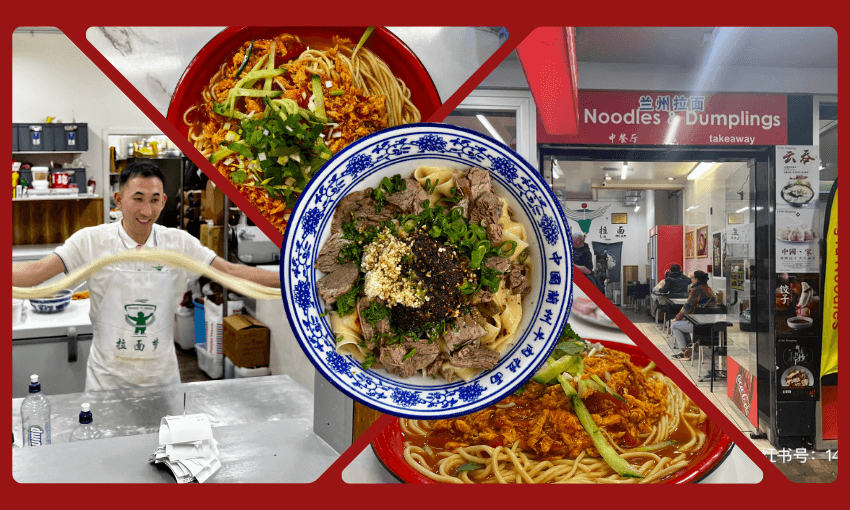Poultry brands in New Zealand are changing their spelling from chicken kiev to chicken kyiv. Ukrainians say the update of two little letters matters a lot.
There’s a scene in the 1973 neo-noir film The Long Goodbye, based on the Raymond Chandler novel of the same name, where a man eats “the fanciest meal” he’s ever had. “I don’t understand how you get the butter in the chicken. When you cut the chicken, the butter comes out,” he gushes, in awe. “I don’t understand.”
The woman who prepared the meal responds, “That’s the secret about it. Chicken kiev.”
These days, the classic dish – breadcrumbed chicken breast stuffed with herb and garlic butter – remains the same, but won’t look the same on paper. The dish is now more likely to be spelled “chicken kyiv”.
This tiny but mighty change in spelling has taken place in supermarket freezers across the nation, in a signal of support for Ukraine.
The last time I unpacked a supermarket click-and-collect order I noticed the packaging on a box of Waitoa free range “chicken kievs” now says “chicken kyivs”.
“Kyiv” is how Ukrainians spell the name of the capital city of Ukraine, but “Kiev” is a transliteration from the Russian word for the city. Yuriy Gladun, former chairperson of the Ukrainian Association of New Zealand’s northern branch, says using “kyiv” instead of “kiev” is Ukrainian people shedding their colonial past. And that includes when referring to the chicken dish.
“The spelling of chicken kyiv is really important. It is part of the war but on a cultural field. We are trying to get rid of the Russian influence in every way – economical, political, cultural and language. That’s why we advance the spelling ‘Kyiv’ – for us, this issue really matters. It might sound simple but it has deep historical roots.”
There has been a campaign by the Ukrainian Ministry of Foreign Affairs, #kyivnotkiev, on social media since 2018 to promote the Ukrainian language transliteration rather than spelling from Russia. The story goes that Kyiv is named after Kyi, one of the city’s legendary founders. The spelling matters to Ukrainians.
In March 2022 Woolworths told Australian media that it was changing its spelling from “kiev” to “kyiv” to stand in solidarity with Ukrainians living in Australia. The brands stocked in the trans-Tasman supermarket chain soon followed suit.
A spokesperson for Ingham’s, the poultry company that owns Waitoa, said they changed the spelling of their Kyiv products in 2024. “The adjustment to the name reflects the Ukrainian spelling and was done with the benefit of discussions with members of the community. “
Like many internationally recognised meals with a long history, there is debate around the origin of the dish. Some say it was created in the kitchen of a Ukraine hotel in the beginning of the 20th century, others say French chefs hired by Russian gentry are responsible for the meal.
“I don’t know who created it, whether it came from Kyiv or Ukraine at all,” Yuriy Gladun says, “But as it carries the name of the Ukraininan capital, we are proud.” He points out that “chicken kyiv” isn’t what people in Ukraine would call it anyway, the dish would be referred to as ‘kotleta po kyivsky’.
Dr Corrinne Seals, Ukrainian-American by birth, is associate professor of applied linguistics at Te Herenga Waka said definitively that the dish should be called chicken kyiv, not chicken kiev.
“Kyiv is a Ukrainian city. We should use the Ukrainian spelling. Language is very political.”
She has noticed spelling of the well-known dish is beginning to change but more slowly than in references to the name of the city Kyiv. When it comes to the chicken meal, she says, people are used to spelling it in a certain way and they don’t necessarily link it to the city Kyiv. While the generally accepted spelling is changing, it will take time to tidy up the long history of the dish.
A Jamie Oliver recipe from 2020 refers to “chicken kiev” (the page includes a 2021 comment from a fan saying “Thank you for a good recipe. But it is KYIV not Kiev. FYI.”). In 2023 he released a recipe for “chicken kyiv” which he calls an “80s classic” – his dad used to make hundreds of them a week for customers in the family pub.
Similarly, celebrity chef Rachael Ray calls it “chicken kiev” on an older recipe published on her website but in a newer recipe from May 2022 she refers to “Kyiv” with the comment, “When I was a little girl, chicken kyiv, then spelled kiev, was a really, really big deal. Everybody loved this.”
The HelloFresh website has a recipe for “baked chicken kievs” but, when asked about spelling, said it was a mistake – the recipe was discontinued four years ago. Even so, “our ANZ style guide across all our assets stipulates that recipes in this cuisine style are to be spelt ‘Kyiv’ and it looks like this one was missed,” HelloFresh spokesperson Amy Hayes said.
A spokesperson for popular UK recipe site Good Food said they changed the name of some recipes earlier this year to bring them in line with other UK media and so that users can find them more easily. Classic chicken kyiv is the #78 chicken recipe on thewebsite so far this year. The web address for the recipe still holds the previous spelling in the URL though.
Closer to home, New World still calls them “chicken kievs”, as do many smaller businesses like delis and privately-owned butchers. Seals says changing the spelling is a small but impactful move businesses can make. “No use of language is ever neutral. If you aren’t aligning with the internationally accepted correct spelling, you are – whether you feel you are or not – showing a type of resistance. It’s important for people to know that if they’re not sure of the preferred spelling or pronunciation Ukrainians would prefer people ask. It is better to ask and get the correct information than keep using something outdated that takes a negative stance.”
Although brands updating the spelling of their products to align with Ukrainian spelling sends a signal, does it matter to most customers? When you’re hungry, does the spelling on the box make a difference?
Tim Morris, director of Food, FMCG & Retail at agri-food market research company Coriolis, thinks 95% of customers won’t even notice the spelling change. “People are astoundingly oblivious. Kiev/Kyiv is one of those place names like Massachusetts, Reykjavík and Liechtenstein that nobody can spell.”
As for the brands who made a change to stand in solidarity with their Ukrainian customers in their local markets, he didn’t think much of it. “It’s like wetting yourself in a dark suit. You get a warm feeling but nobody notices.”
Seals disagrees. “For people for whom what’s happening in Ukraine matters, those people will notice.”




